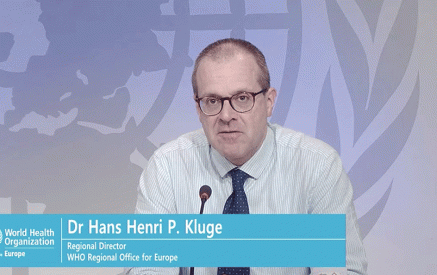Statement by WHO/Europe Regional Director, Dr Hans Henri P. Kluge
Last week Europe and central Asia saw 27,000 additional COVID-19 deaths and 2.6 million new cases. Infections, still predominantly from the Delta variant, are 40% higher now, than during the same period last year.
Since its identification, 27 days ago, the Omicron variant of concern has been detected in at least 38 of the 53 Member States of the WHO European Region.
There are still numerous unanswered questions around Omicron, but here is what we know today:
Read also
We can see another storm coming – Omicron is becoming, or has already become dominant, in several countries including in Denmark, Portugal and the United Kingdom, where its numbers are doubling every one and a half to three days, generating previously unseen transmission rates.
Within weeks, Omicron will dominate in more countries of the Region, pushing already stretched health systems further to the brink. Omicron is likely to become the dominant variant circulating in our Region.
The sheer volume of new COVID-19 infections could lead to more hospitalizations and widespread disruption to health systems and other critical services. It has unfortunately already resulted in hospitalizations and deaths.
This variant can evade previous immunity in people – so it can still infect those who have had COVID-19 in the past, those who are unvaccinated, and those who were vaccinated many months ago.
Individuals who have recovered from COVID-19 are three to five times more likely to be reinfected with Omicron compared to Delta.
We don’t yet know whether Omicron causes more severe disease than the Delta variant.
On a positive note, early evidence supports the assumption that COVID-19 vaccines continue to do their job and save lives.
Based on the earliest Omicron cases reported to WHO/Europe, 89% of those people reported common COVID-19 symptoms – cough, sore throat, fever.
Up until now, the Omicron variant has been transmitted mostly among adults in their 20s and 30s, spreading initially in large cities and in clusters associated with social and workplace gatherings.
So there are three things that we need to do urgently: protect ourselves through vaccination, prevent further infections, and prepare health systems for a surge in cases.
Number one: It is vital that we scale-up vaccine uptake, be it a first, second or an additional / booster dose, starting with people at risk of severe COVID-19 and healthcare workers. We must protect the vulnerable. And we must also protect our health workforce to safeguard health systems.
If you are unvaccinated – get the jab. If you have had COVID-19 in the past – get the jab. If you are due a booster – get the jab.
Number two: Vaccination offers the best protection against severe disease and death, and this goes hand-in-hand with other measures we can all take to prevent infection. We all know what this means: avoiding crowded, closed, and confined spaces; keeping a physical distance from others; frequently washing hands; wearing a mask; coughing or sneezing into a bent elbow or tissue; and properly ventilating indoor spaces.
At this time of year when there are many social gatherings, evaluate your risk, and the risk to others and prioritize those events that are most important to you.
And number three: governments and authorities need to prepare our response systems for a significant surge.
Health authorities must strengthen capacity: increasing testing and trace capacities; engaging primary health care in case management; preparing hospitals for a surge, and supporting health and frontline workers.
Two years in, our health workers are being severely tested once again. It is deeply worrying that one in five is suffering from anxiety and depression from the pandemic. Their concerns must be addressed, and their need for manageable working conditions supported.
This remains a difficult time for all of us. But none of our tools are made redundant by Omicron. All are as relevant as before, and we know what to do.
Stay safe, stay healthy this holiday season.
The World Health Organization



























































